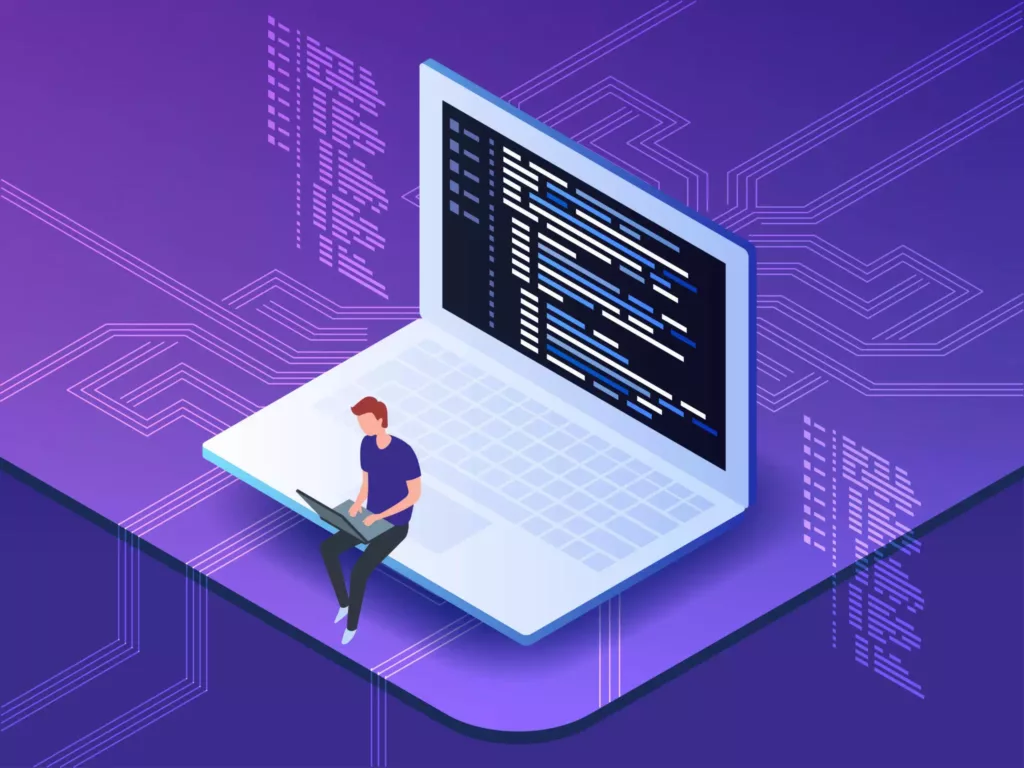It’s 2025, when having good tech support is crucial for businesses, with businesses losing an average of $5,600 per minute during downtimes. According to an IHS research report, while an average mid-sized company incurs annual costs of $1 million due to incidents, large enterprises can face expenses of $60 million or more..
You need some degree of IT support, from building and maintaining your own websites, to more complex projects like building your own apps. Thus, the ability to identify and recruit skilled programmers is crucial for any organization’s success.
However, for non-technical managers, evaluating programming talent can feel like navigating a foreign language. This article provides a comprehensive guide to help you recognize the qualities and skills that distinguish good programmers, enabling you to make informed decisions when employing IT Staff Augmentation service.
Table of Contents
1. What Makes A Good Programmer?
A good programmer is more than just a person who can write code. They are problem-solvers, collaborators, and continuous learners who combine technical expertise with essential soft skills to deliver high-quality software solutions. Recognizing these individuals involves evaluating a combination of technical and soft skills, as well as observing their work habits and approach to development.
2. 10 Qualities of a Good Programmer That You Need To Look For
Good programmers possess a unique blend of technical expertise and essential soft skills that enable them to excel in their craft. Here’s an elaborated look at the key qualities that define a good programmer:
- Problem-Solving Skills: Programming is fundamentally about solving problems. Good programmers can analyze complex problems, break them down into smaller, manageable components, and devise effective solutions. They possess strong logical thinking and analytical skills, enabling them to approach problems systematically and creatively .
- Attention to Detail: Precision is paramount in programming. A single misplaced character in code can have significant consequences. Good programmers are meticulous and detail-oriented, ensuring accuracy in their work. They carefully review their code, paying close attention to even the smallest details to prevent errors and ensure code quality .
- Curiosity and Continuous Learning: The technology landscape is constantly evolving. Good programmers are committed to lifelong learning, staying updated with the latest technologies and best practices. They are curious and eager to explore new tools and approaches, ensuring their skills remain relevant and in demand .
- Strong Communication Skills: Effective communication is crucial for programmers to collaborate with colleagues, understand project requirements, and explain technical concepts to non-technical stakeholders. They should be able to articulate their ideas clearly, both in writing and verbally, adapting their communication style to different audiences .
- Team Player: Software development is often a collaborative effort. Good programmers are team players who can effectively work with others, share knowledge, and contribute to a positive and productive work environment. They value teamwork, respect diverse perspectives, and contribute to a collaborative atmosphere .
- Adaptability: Project requirements and priorities can change quickly. Good programmers are adaptable and flexible, able to adjust to new tools, frameworks, and changing project requirements without losing momentum. They embrace change, learn new technologies quickly, and apply their skills to different situations .
- Efficiency and Productivity: Good programmers write clean, maintainable code quickly and effectively. They understand coding principles and best practices, enabling them to produce high-quality code that is easy to understand and modify. They strive for efficiency, optimizing their code for performance and maintainability .
- Time Management: Meeting deadlines is crucial in software development. Good programmers are organized and efficient, able to prioritize tasks and meet deadlines. They manage their time effectively, ensuring timely project delivery without compromising quality .
- Passion for Coding: Good programmers have a genuine interest in programming and enthusiasm for the craft. They enjoy the challenges of programming, the process of creating something new, and the satisfaction of solving problems. This passion drives them to excel and stay motivated.
- Patience and Persistence: Programming can be challenging, and setbacks are inevitable. Good programmers stay calm under pressure and persist through challenging problems. They demonstrate patience, perseverance, and a “never give up” attitude when faced with obstacles .

3. Hiring Good Programmers for Non-Technical People
Hiring programmers can be daunting for non-technical people, but understanding the key aspects of programming and the recruitment process can make it easier. Here’s a breakdown of how to approach hiring good programmers:
3.1. Understanding Technical Requirements
Before you start the hiring process, it’s crucial to understand the technical needs of your project or organization. This involves:
- Basic Programming Concepts: Familiarize yourself with fundamental programming concepts like variables, data types, loops, and functions. This basic understanding will help you communicate with programmers and understand their explanations .
- Industry-Specific Needs: Different industries have unique technical requirements. For example, a fintech startup might need programmers with expertise in cybersecurity and database management, while a gaming company might prioritize programmers with experience in graphics rendering and game engines .
3.2. Evaluating Technical Skills
Assessing a programmer’s technical skills is crucial, even for non-technical managers. Here are some methods:
- Coding Assessments: Use coding challenges and assignments to evaluate a candidate’s practical coding abilities. Platforms like HackerRank offer standardized tests and the option to create custom assignments tailored to your needs .
- Technical Interviews: Involve a subject matter expert, such as an experienced software engineer, in the interview process. They can assess the candidate’s knowledge of data structures, algorithms, and system design through real-life scenarios and technical questions .
Technical skills are the foundation of a programmer’s abilities. These include:
- Proficiency in Programming Languages: Good programmers have a strong command of one or more programming languages, such as Python, Java, JavaScript, or C++. They understand the syntax, libraries, and frameworks associated with these languages and can apply them effectively to different projects .
- Data Structures and Algorithms: A solid grasp of data structures and algorithms is crucial for writing efficient and optimized code. Good programmers understand how to organize and manipulate data effectively, choosing the right data structures and algorithms to solve specific problems and ensure optimal performance .
- Database Knowledge: Most applications rely on storing and retrieving data, making database knowledge essential for programmers. They should understand how databases work, be familiar with SQL, and know how to interact with databases programmatically .
3.3. Assessing Soft Skills
Assessing a programmer’s capabilities involves evaluating both their technical skills and soft skills. Soft skills are essential for effective collaboration and communication with stakeholders. Here are some evaluation methods:
- Behavioral Interviews: Use behavioral questions to understand how a candidate has handled past challenges. This provides insights into their problem-solving skills, communication style, and teamwork abilities.
- Cultural Fit: Determine if the candidate’s values and work style align with your organization’s culture. Explore their preferred work environment, teamwork experiences, and approach to challenges.
Several traits contribute to a programmer’s success:
- Problem-solving abilities: Programmers should be problem-solvers, analyzing challenges, breaking them down, and developing effective solutions using logical thinking and analytical skills.
- Attention to detail: Given the potential consequences of even small coding errors, programmers should be detail-oriented and ensure accuracy.
- Continuous learning: The technology landscape is constantly evolving, so programmers should be committed to lifelong learning and staying current with trends.
- Collaboration and teamwork: Software development is often a team effort. Programmers should be team players, working effectively with others and contributing to a productive environment.
- Communication skills: Effective communication is crucial for programmers to collaborate, understand project requirements, and explain technical concepts to various audiences. They should articulate ideas clearly, both verbally and in writing.
4. Programmer Skills for Non-Technical Managers
4.1. What Skill Do You Need To Help You Better Manage Your Programmers
While you may not need to write code yourself, understanding key programmer skills can significantly improve your ability to manage and collaborate with technical teams. This involves:
- Languages and Frameworks: Familiarize yourself with common programming languages like JavaScript, Python, and Java, as well as popular frameworks like React and AngularJS. This will help you understand the technical discussions and challenges faced by your team.
- Version Control: Understand the basics of version control systems like Git. This will help you appreciate how programmers track changes, collaborate on code, and manage different versions of their software .
- Problem-Solving Approach: Gain insights into how programmers approach problem-solving. This includes understanding concepts like debugging, algorithmic thinking, and code optimization .
4.2. Other Skills Needed To Effective Communicate with Programmers
- Clear and Concise Requirements: When communicating project requirements, be clear, concise, and avoid technical jargon . Use real-world examples and analogies to explain your needs in a way that programmers can easily understand.
- Understanding Technical Limitations: Recognize that there are technical limitations to what can be achieved. Be open to discussing these limitations with programmers and finding alternative solutions that meet your business needs .
- Fostering Mutual Understanding: Promote mutual understanding between technical and non-technical teams by encouraging the use of clear language, visual aids, and real-world examples . Organize workshops or training sessions to bridge the knowledge gap and facilitate communication.
- Encouraging Collaboration: Foster a collaborative environment where technical and non-technical teams can work together effectively . Encourage open communication, knowledge sharing, and mutual respect.

Conclusion: Developer Recruitment for Startups
In conclusion, recognizing and hiring good programmers is crucial for any organization’s success, especially in today’s technology-driven world. By understanding the essential qualities of a good programmer, from technical skills to soft skills, non-technical managers can make informed decisions during the recruitment process. This involves evaluating technical expertise, problem-solving abilities, communication skills, and the candidate’s fit within the company culture. For startups, attracting and retaining top programming talent requires a strategic approach that highlights the company’s mission, offers growth opportunities, and fosters a positive work environment.
However, building a strong in-house development team can be time-consuming and resource-intensive. This is where an IT Staff Augmentation service can be a valuable solution. By partnering with a reliable provider, businesses can quickly access skilled programmers, scale their teams efficiently, and meet project deadlines without compromising on quality. This approach allows companies to focus on their core business objectives while leveraging external expertise to enhance their development capabilities. Ultimately, whether through direct hiring or staff augmentation, the key to success lies in recognizing and nurturing the talent that drives innovation and growth.